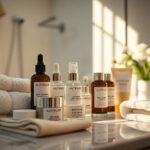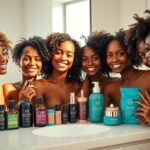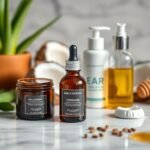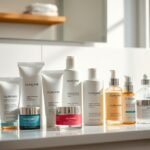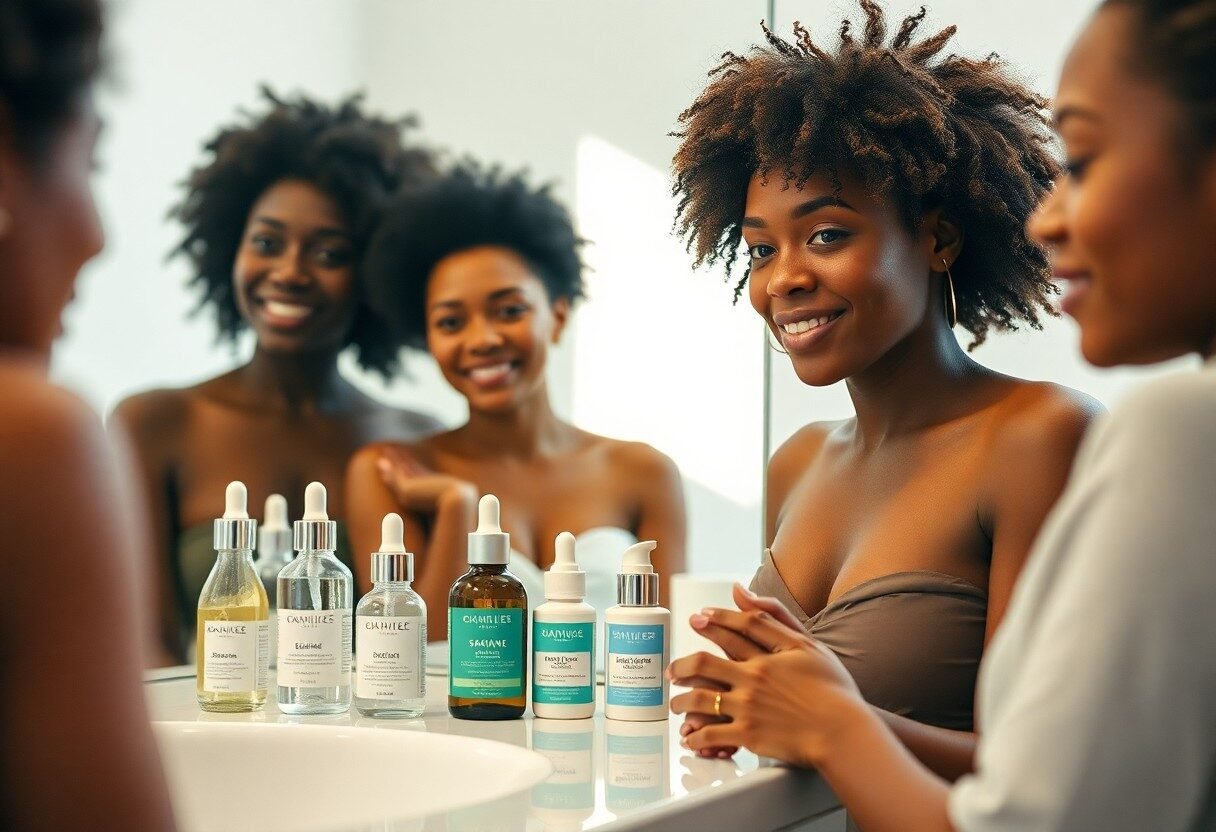
You deserve to embrace your skin’s natural beauty, and finding the right skincare products is necessary for achieving that goal. Concerning melanated skin, I’ve discovered that certain products cater specifically to our unique needs. It’s important to choose items that effectively address issues like hyperpigmentation and dryness, while also providing adequate protection against harmful UV rays. In this blog post, I’ll share my insights on effective skincare products that can enhance your routine and promote healthy, radiant skin.
Key Takeaways:
- Melanated skin often requires products that help maintain hydration and balance oil production to prevent breakouts.
- SPF protection is imperative for all skin types; choose broad-spectrum sunscreens to protect against UVA and UVB rays.
- Incorporate antioxidants such as vitamin C to help brighten the complexion and even skin tone.
- Look for products that contain gentle exfoliating ingredients like lactic acid or glycolic acid to promote cell turnover without irritation.
- Moisturizers with ingredients like shea butter or hyaluronic acid can effectively hydrate without clogging pores.
- Seek out specialized formulations designed for hyperpigmentation, as these can target dark spots and uneven skin tone.
- Consult with a dermatologist to tailor skincare routines to individual needs, especially for concerns like acne or discoloration.
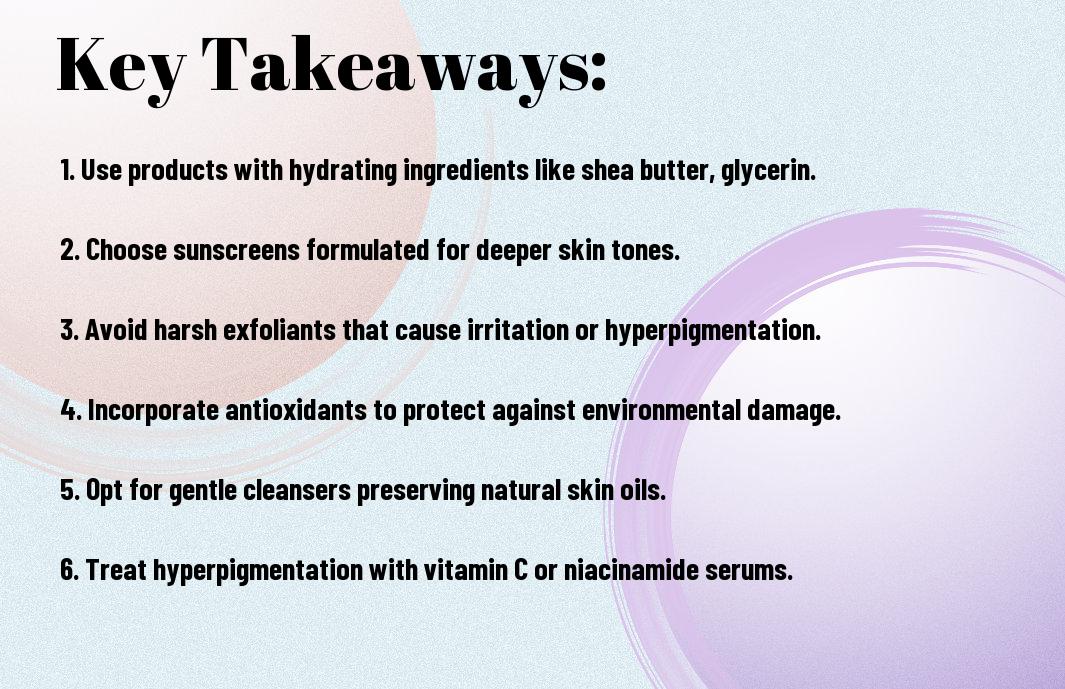
The Unique Challenges of Melanated Skin
Hyperpigmentation: Causes and Solutions
Hyperpigmentation arises when excess melanin creates dark spots or patches on your skin. Often caused by factors such as sun exposure, inflammation, or hormonal changes, this condition can be particularly persistent in melanated skin. Solutions to combat hyperpigmentation include using products featuring vitamin C, helical acid, and brightening agents that promote an even skin tone. Consistency is key; incorporating these products into your daily routine can yield visible results over time.
The Role of Sun Damage in Darker Skin Tones
Contrary to popular belief, melanated skin is not immune to sun damage. Many individuals with darker complexions underestimate the need for SPF protection, leading to skin issues like hyperpigmentation and accelerated aging. The melanin in your skin offers some level of protection, but it doesn’t completely shield you from harmful UV rays. Regularly applying sunscreen with a broad-spectrum SPF of 30 or higher can significantly reduce your risk of sun-related skin concerns.
Even with natural sunscreen protection from melanin, darker skin tones are susceptible to sunburn, particularly in areas where melanin density is lower. Over time, unprotected sun exposure may cause deep-rooted issues like photoaging and worsen existing hyperpigmentation. Seeking shade, wearing protective clothing, and using a broad-spectrum sunscreen daily can effectively mitigate these risks. Make it a routine to check for skin changes and consult with a dermatologist for tailored guidance on protecting your unique skin type.
Essential Ingredients for Radiant Melanin
Vitamin C: The Brightening Powerhouse
Vitamin C is a standout player in skincare for melanated skin. This potent antioxidant not only brightens your complexion but also helps reduce dark spots and hyperpigmentation. By promoting collagen production, it enhances skin elasticity and firmness, resulting in a more youthful appearance. Plus, it provides protection against environmental aggressors, making it an crucial part of your skincare routine.
Niacinamide: Balancing and Brightening Benefits
Niacinamide, or vitamin B3, tackles multiple skin concerns at once: it balances oil production and reduces enlarged pores while enhancing skin tone. This remarkable ingredient can help combat dark spots, making it particularly beneficial for those with varying pigmentation. Incorporating niacinamide into your routine can lead to a noticeably clearer and more radiant complexion.
Moreover, niacinamide works synergistically with other ingredients, boosting their effectiveness. Studies indicate that this potent compound can significantly lighten dark areas while improving overall skin texture. Incorporating a niacinamide serum or cream can bring about impressive results within weeks, making skin appear more even and luminous.
Hyaluronic Acid: Hydration for All Skin Types
Hyaluronic acid is a hydrating hero for all skin types, especially for melanated complexions that can often experience dryness or ashy appearance. This ingredient is capable of holding up to 1000 times its weight in water, ensuring that your skin remains plump and hydrated all day long. Incorporating it into your skincare regimen helps not only to maintain moisture levels but also to improve skin texture and resilience.
| Ingredient | Benefits |
| Vitamin C | Brightens skin, reduces dark spots |
| Niacinamide | Balances oil, improves skin tone |
| Hyaluronic Acid | Deep hydration, plumpness |
| Retinol | Anti-aging, improves texture |
| Alpha Arbutin | Gentle brightening |
Overall, hyaluronic acid is crucial in preventing moisture loss, particularly in the challenging environment we face daily. By regularly applying products with hyaluronic acid, you’ll notice visible improvements in skin hydration, minimizing the appearance of fine lines. Over time, maintaining hydrated skin can balance your complexion, giving you a glow that radiates health.
- Hyaluronic Acid provides moisture retention.
- Hydration improves skin texture.
- All skin types can benefit from this ingredient.
- Plump skin visibly reduces fine lines.
- Importantly, The use of hyaluronic acid in your regimen is a game-changer.
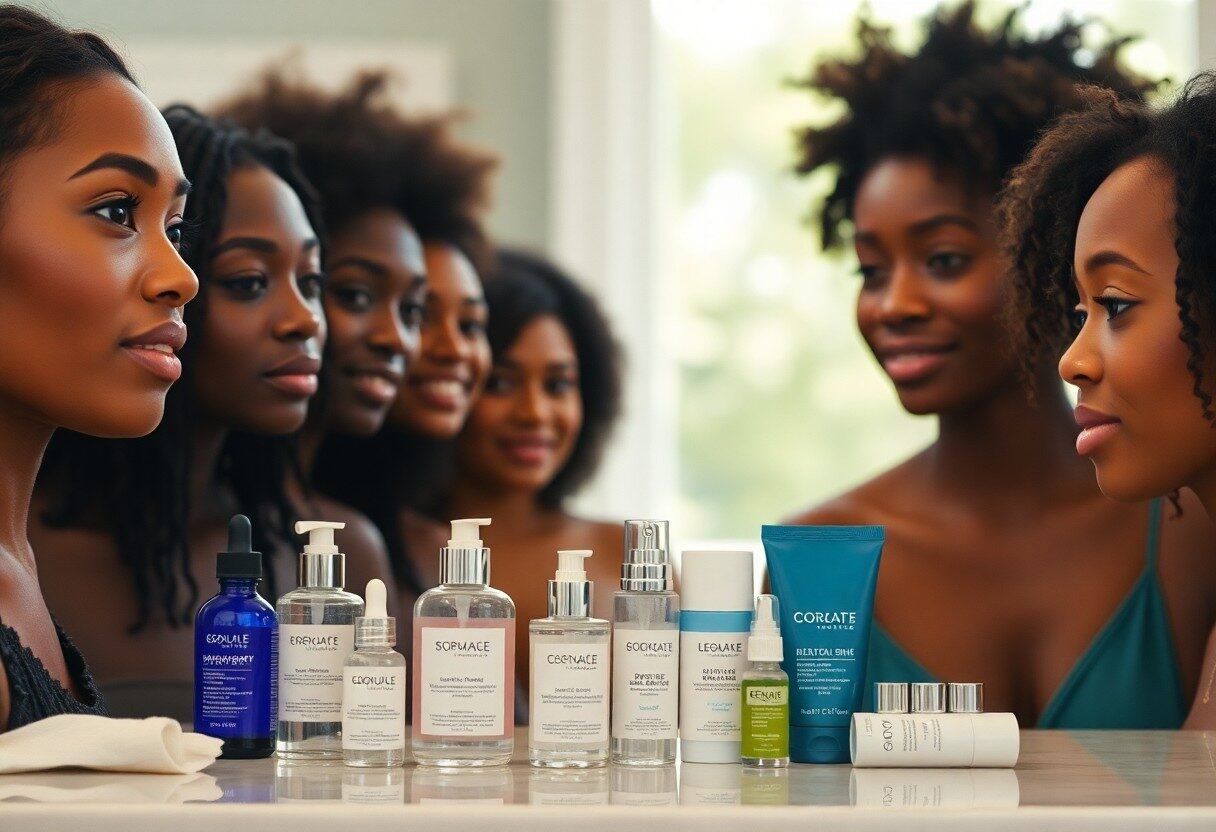
SPF: The Non-Negotiable for Melanated Skin
The Myths Surrounding SPF and Darker Skin
Many believe that those with darker skin are less susceptible to sun damage, leading to a common myth that they don’t need SPF. However, this misconception can result in significant skin issues, including premature aging and even skin cancer. The reality is that while melanin does provide some natural protection against UV rays, it doesn’t eliminate the need for daily sun protection.
Types of Sunscreens Suitable for Melanated Skin
When identifying the right sunscreen, it’s vital to pick one that blends well and doesn’t leave a white cast. I often recommend looking for products that are labeled as “sheer” or “invisible.” Physical or mineral sunscreens with zinc oxide or titanium dioxide are great options, as they offer broad-spectrum protection without potentially irritating chemicals for melanin-rich skin. I also appreciate formulations that include moisturizing ingredients to keep the skin hydrated.
| Type of Sunscreen | Benefits |
| Mineral Sunscreens | Broad-spectrum protection, less irritating |
| Cream Formulations | Hydrating and easy to apply |
| Matte Finish Gel | Ideal for oily skin, no shine |
| Tinted Sunscreens | Offers a color match for deeper skin tones |
| Water-Resistant Options | Long-lasting protection, ideal for active lifestyles |
- Mineral sunscreen provides effective protection.
- Tinted formulations perfectly match melanin-rich tones.
- Hydrating ingredients keep your skin glowing.
- Matte sunscreens are ideal for those with oily skin.
- Water-resistant options are a must for active days.
Perceiving the myriad options available for melanated skin highlights the necessity of choosing a suitable sunscreen. From lightly tinted formulas that effortlessly complement your rich complexion to hydrating creams that keep your skin supple, the market has evolved dramatically. Always check for broad-spectrum protection against both UVA and UVB rays, which ensures comprehensive care. Investing in a quality sunscreen is just as vital as any other aspect of your skincare routine.
| Feature | Importance |
| Broad Spectrum | Protects against various sun damage |
| Non-Comedogenic | Won’t clog pores or cause breakouts |
| Added Moisturizers | Keeps skin hydrated and healthy |
| Suitable for All-Day Wear | Comfortable to wear without irritation |
| Mineral-Based | Less likely to irritate sensitive skin |
- Broad-spectrum protection is crucial against varying UV rays.
- Non-comedogenic formulations cater to acne-prone skin types.
- Added moisturizers offer a dual benefit of hydration.
- Long-lasting comfort allows for extended wear.
- Mineral options suit sensitive individuals.
Perceiving the importance of selecting a suitable sunscreen puts your skincare journey on the right path. Combining effective protection with proper hydration leads to healthier skin for years to come. Keep your SPF game strong; your complexion deserves the very best in every element of skincare!
The Importance of Regular Exfoliation
Exfoliation plays a vital role in achieving a radiant, even-toned complexion for melanated skin. Regularly removing dead skin cells not only increases cellular turnover but also enhances the effectiveness of your skincare products. By gently polishing away the surface layer, you allow serums and moisturizers to penetrate deeper, maximizing hydration and nourishment. For darker skin tones, maintaining an exfoliation routine can also help reduce the appearance of hyperpigmentation, ensuring your complexion looks its best.
Physical vs. Chemical Exfoliators: What to Choose
Choosing between physical and chemical exfoliators depends largely on your skin type and sensitivity. Physical exfoliators, such as scrubs with fine grains or brushes, offer immediate results by physically removing dead skin. They’re ideal for those who prefer a traditional approach. On the other hand, chemical exfoliators, containing ingredients like alpha-hydroxy acids (AHAs) or beta-hydroxy acids (BHAs), dissolve dead skin cells at a molecular level, offering a gentler, often more effective solution. If you’re prone to sensitivity or irritation, chemical exfoliators may be the superior choice.
How Exfoliation Prevents Dark Spots
Exfoliation helps to minimize dark spots by promoting the shedding of dead skin cells and revealing fresh, new skin underneath. This process breaks up excess melanin that can cause uneven pigmentation. By incorporating exfoliation into your routine, you maintain brighter skin and support overall clarity, which is especially important in preventing the long-term effects of sun exposure and other environmental factors that plague melanated skin.
Regular exfoliation vitally interferes with the buildup of melanin, which is responsible for dark spots. Over time, neglecting to exfoliate can lead to a dull appearance and an increased risk of hyperpigmentation. By consistently removing dead skin, you not only foster a more uniform skin tone but also create a resilient barrier, reducing the chances of future spots. For optimal results, aim for exfoliation 1-3 times a week, adjusting frequency based on your skin’s response and sensitivity.
Moisturizers that Celebrate Diversity
Ingredients that Nourish Melanated Skin
Choosing moisturizers rich in natural ingredients can transform your skincare routine. Look for products containing shea butter, jojoba oil, and aloe vera, which not only hydrate but also promote skin elasticity. Vitamin E is another powerhouse, known for its antioxidant properties and ability to enhance the skin’s natural barrier, making it particularly beneficial for melanin-rich complexions prone to dryness and uneven texture.
Finding the Right Consistency for Your Skin Type
Selecting the perfect moisturizer goes beyond just ingredients; consistency matters too. Lightweight gels are fantastic for oily skin, allowing for hydration without clogging pores, while creamier formulas provide the deeper hydration that dry or combination skin types crave.
Understanding your specific skin needs can steer you toward the right type of moisturizer. For those with oily skin, lightweight, gel-based moisturizers that absorb quickly can maintain hydration without causing breakouts. In contrast, if your skin leans towards dryness, a heavier cream packed with emollients will not only lock in moisture but also improve skin texture and radiance. Tailoring your moisturizer to your skin type can significantly enhance your overall complexion and comfort.
Targeted Treatments for Common Concerns
Serums and Spot Treatments for Hyperpigmentation
For those battling hyperpigmentation, incorporating serums enriched with Vitamin C, niacinamide, or alpha arbutin can be transformative. These ingredients work synergistically to lighten dark spots and even out skin tone. Spot treatments should be used sparingly on affected areas to deliver a concentrated dose, enhancing their effectiveness. I often recommend applying treatments with a gentle patting motion, as this technique encourages absorption and minimizes irritation.
The Role of Regular Facial Treatments
Regular facial treatments can significantly boost your skincare routine, helping to address specific skin concerns such as dryness, inflammation, and uneven texture. Treatments such as chemical peels or enzymatic exfoliations remove dead skin cells, revealing a more radiant layer underneath. Scheduling these services every 4-6 weeks allows for a consistent approach towards maintaining your skin’s health and radiance. For melanin-rich skin, services tailored to your unique skin type—like extractions or hydrating masks—ensure you benefit fully without any adverse reactions.
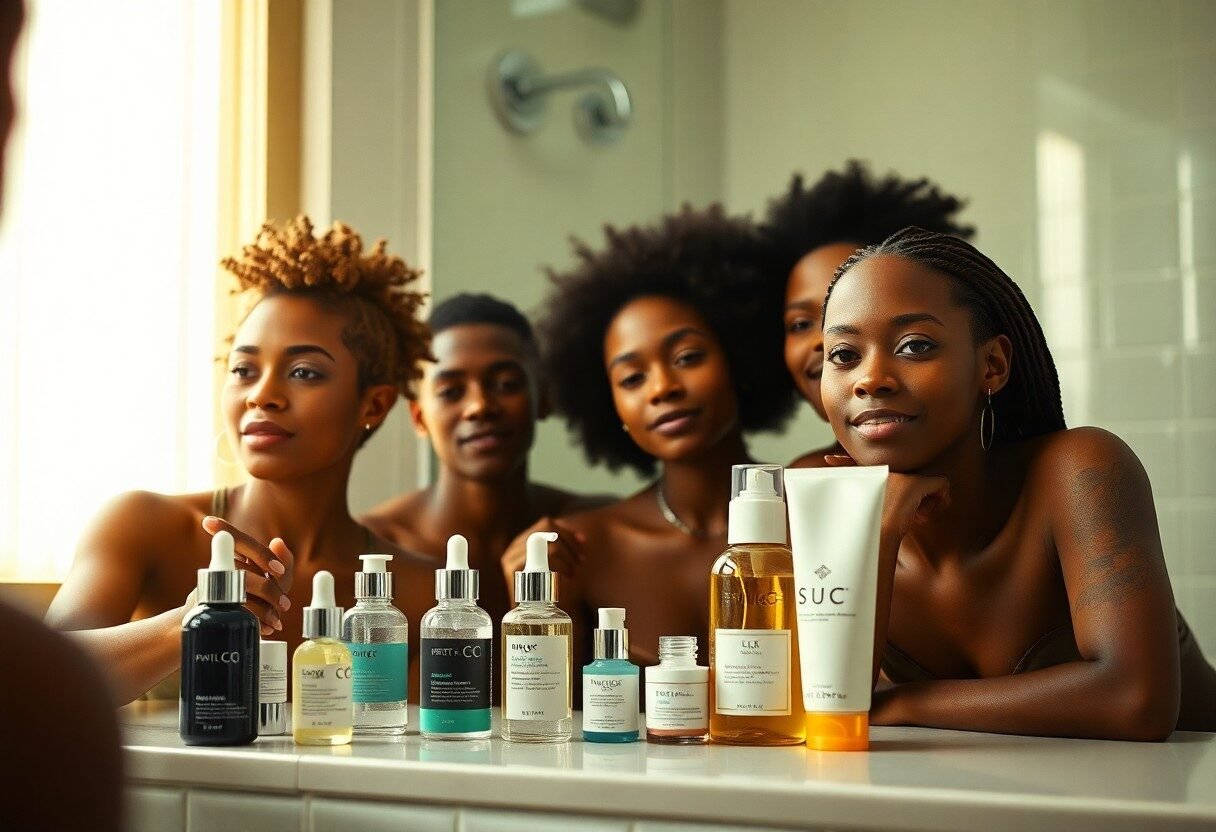
Building a Comprehensive Skincare Routine
Morning vs. Night: Tailoring Your Skincare
Establishing a morning and night routine allows me to tailor my products to fit my skin’s needs at different times of the day. In the morning, I prefer lightweight serums, sunscreen, and hydrating moisturizers that provide a protective barrier against environmental aggressors. At night, I switch to richer formulations with active ingredients like retinol or glycolic acid to promote cellular turnover and repair while I sleep. This strategic approach helps to optimize the benefits of my products, ensuring my skin remains healthy and vibrant around the clock.
Seasonal Adjustments: Adapting to Weather Changes
Your skin may respond differently depending on the season, which is why seasonal adjustments to your skincare routine are vital. Summer typically calls for lighter, oil-free products, while winter necessitates richer creams and oils to combat dryness. Monitoring your skin’s response to changes in humidity and temperature helps in selecting appropriate products.
During the warm months, my skin can lean towards oiliness, so I focus on gel-based moisturizers and lightweight sunscreens. Conversely, in winter, the cold air often leaves my skin parched, prompting me to reach for thicker creams infused with nourishing ingredients like shea butter or jojoba oil. This fluid adaptability not only protects against seasonal skin concerns but also keeps my complexion looking radiant no matter the weather. Tailoring your routine can lead to improved texture, reduced irritation, and an overall healthy glow.
Cutting Through the Noise: Product Recommendations
Top Brands Celebrating Melanated Skin
Some brands have excelled in recognizing and catering to the needs of melanated skin, such as Sunnies Face and The Ordinary. I admire Fenty Skin for its inclusive approach and effective formulations designed to target issues experienced by dark skin tones, like hyperpigmentation. Olay also offers products specifically formulated for deeper complexions, ensuring that you aren’t compromising efficacy for representation.
Budget-Friendly Options vs. High-End Choices
Exploring both budget-friendly and high-end skincare options can yield excellent results for your routine. Brands like CeraVe and Black Girl Sunscreen provide effective products without breaking the bank, while luxury brands like Drunk Elephant and Pat McGrath Labs offer high-performance formulations that justify their price tags.
While budget-friendly choices deliver impressive results, high-end products often employ innovative ingredients and research-backed formulations that can address specific issues more effectively. For instance, Drunk Elephant’s Lala Retro Whipped Cream is renowned for its ability to deeply hydrate and nourish, while CeraVe’s Moisturizing Cream remains a staple for everyday hydration. Weighing your skincare goals against the value of each option allows you to curate a routine that meets your skin’s unique needs without sacrificing quality.
Summing up
Presently, I understand that selecting effective skincare products for melanated skin requires careful consideration of ingredients and formulation. You should prioritize products rich in hydration, antioxidants, and broad-spectrum UV protection to maintain your skin’s vibrancy and health. I encourage you to explore options that focus specifically on issues commonly faced by melanated skin, such as hyperpigmentation and dryness. By tailoring your skincare routine to your unique needs, you can achieve a radiant complexion that celebrates your skin’s natural beauty.
FAQ
Q: What are some skincare ingredients that benefit melanated skin?
A: Melanated skin can benefit from ingredients that promote hydration, even skin tone, and enhance radiance. Key ingredients include glycerin for moisture, niacinamide for skin barrier support and brightening, vitamin C for reducing hyperpigmentation, hyaluronic acid for hydration, and alpha hydroxy acids (AHAs) for gentle exfoliation. Incorporating these ingredients can help maintain well-hydrated and balanced skin.
Q: How does melanin affect the skincare needs of darker skin tones?
A: Melanin provides some natural protection against UV radiation, reducing the likelihood of sunburn. However, individuals with darker skin may still experience issues like hyperpigmentation and uneven skin tone. Effective skincare for melanated skin involves targeted treatments for these concerns, emphasizing moisturization, sun protection, and gentle exfoliation to maintain an even complexion.
Q: Are there specific sunscreens recommended for darker skin?
A: When choosing a sunscreen for darker skin, look for broad-spectrum formulations with SPF 30 or higher that incorporate physical (zinc oxide or titanium dioxide) or chemical filters. These options are often lightweight and non-greasy, which helps to prevent residues that may leave a white cast. Additionally, using tinted sunscreens can also serve to enhance skin tone while providing UV protection.
Q: What is the importance of hydration for melanated skin?
A: Hydration plays a vital role in maintaining the health and appearance of melanated skin. Well-hydrated skin is less prone to issues like flakiness, dullness, and irritation. Products containing hydrating ingredients, such as hyaluronic acid, glycerin, and ceramides, can help to reinforce the skin barrier and maintain optimal moisture levels, ensuring the skin appears radiant and smooth.
Q: Can exfoliation help with hyperpigmentation in melanated skin?
A: Yes, exfoliation can be beneficial in addressing hyperpigmentation. Regular exfoliation using chemical exfoliants like glycolic acid or lactic acid can help fade dark spots and promote cell turnover. However, it’s important to exfoliate gently and not overdo it, as excessive exfoliation can lead to irritation and further hyperpigmentation. A gradual routine is key to achieving desired results.
Q: What type of moisturizer is best for melanated skin?
A: A good moisturizer for melanated skin should be rich in emollients and occlusives to lock in moisture and provide nourishment. Look for products containing ingredients like shea butter, cocoa butter, or natural oils (e.g., jojoba oil or argan oil) that promote hydration without being comedogenic. Creams or lotions that offer both hydration and a luminous finish can enhance the skin’s appearance and texture.
Q: How often should I adjust my skincare routine for seasonal changes?
A: It’s advisable to assess your skincare routine with each season as skin’s needs can vary with changes in weather. During colder months, skin may require more moisture and heavier creams, while warmer months might necessitate lighter formulations and increased sun protection. Keep an eye on your skin’s condition, and make adjustments as needed to maintain balance and hydration throughout the year.
